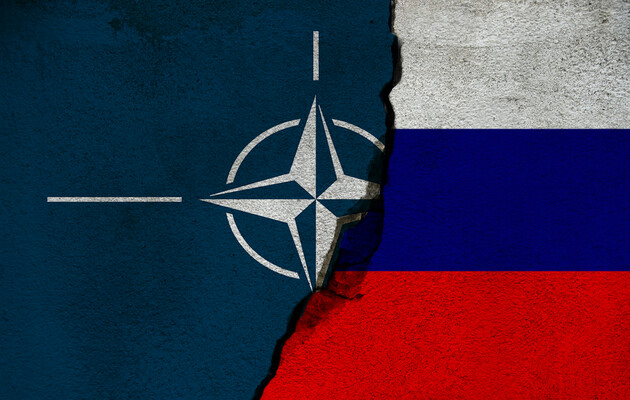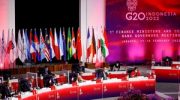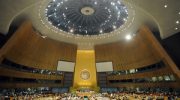But when Russia's war against Ukraine is over, the Alliance will have a chance to correct that mistake.

“Ukraine is not just a neighboring country for us. This is an integral part of our history, culture and spiritual space, “Vladimir Putin said in a speech in February before the war . It was a shocking speech that shook the world. Western countries have united in an unprecedented response to the Russian invasion, imposing sanctions and sending military aid to Ukraine. Almost the whole world is united in condemning Russia, although “heavyweights” such as India and China have remained silent. Although Putin openly declared his excuses for the war, some began to look for other culprits.
In particular, political scientist George Mirsheimer of the University of Chicago argued that the war in Ukraine began “through the fault of the West, especially the United States.” He argued that the crisis could have been avoided had it not been for NATO's decision to admit new members after the Cold War. Mirsheimer especially blames the United States for recklessly promoting NATO enlargement in 2008 by granting membership to Ukraine (and Georgia), ignoring Moscow's “red lines.” And he is completely wrong, writes Ivo Daalder, the US Permanent Representative to NATO in 2009-2013, in The Economist.
Even over Russia's war against Ukraine, too much ink has been spent on why NATO is to blame for Russia's threat to its neighbor. But after the invasion, after Putin declared Ukrainian statehood a fabrication, after bombs fell on hospitals and orphanages, after the ruthless bombing of Mariupol began, further accusations throughout NATO are, frankly, absurd. When the Cold War ended, for the first time in decades, Central and Eastern European countries were able to look to the future without external dominance. The question was whether this would be a future without wars. In 1990, Professor Mirsheimer argued that soon everyone would miss the Cold War. He was convinced that without this conflict, NATO would disintegrate, as would the Warsaw Pact alliance. And the United States will leave Europe.
Professor Mirsheimer's experiences were shared by leaders in Washington and European capitals. But instead of disbanding NATO and withdrawing American troops from Europe, American leaders realized that the stability of Europe's future required both the Alliance and the American army. They united around the vision of George W. Bush, which he outlined in May 1989 in an article entitled “To make Europe whole and free.” NATO was important to achieve both goals.
Read also: With Ukraine, NATO would be much stronger – Zelensky
In the early 1990s, Central and Eastern European countries applied to join the Alliance so that they could enjoy the same peace and security as all Western European member states. NATO allowed new members to join, as it did throughout the Cold War. An “open door” policy has emerged, fully in line with the security declarations signed by all European countries, including Russia. These documents were to guarantee the right of each country to choose its own Alliances and security agreements. Within 15 years of the fall of the Berlin Wall, 10 former Warsaw Pact countries and the Soviet Union have joined the Atlantic Alliance. Moscow has always expressed its displeasure, but it has developed close relations with the Alliance and signed the NATO-Russia Founding Act in 1997. And in 2002, the NATO-Russia Council appeared. In 2000, Putin even allowed Russia to join the Alliance.
The prospect of membership in both the Alliance and the EU has given the countries of Central and Eastern Europe a vital impetus to reform their economies, governance systems and become market democracies. Membership has also provided the desired security guarantees from the United States and other NATO countries. These guarantees were especially important for countries such as Lithuania, Latvia, Estonia and Poland, which border on Russian territory.
For NATO and the new members, as well as other European countries, enlargement has brought security and stability to every part of Europe where conflicts have continued throughout history. However, the European zone of stability and security has not spread to the whole continent. Ukraine, in particular, has remained outside the NATO umbrella. In 2008, Kyiv tried to change this by asking the Alliance to begin Ukraine's accession process. The Allies were divided on the correctness of this step. Some feared Moscow's reaction. Instead of postponing the issue due to a lack of consensus, NATO came up with a wording that precluded immediate membership, but promised that Ukraine would join the Alliance in the future. The compromise did not satisfy anyone. Ukraine received a promise, not real membership. The Allies remained divided on this issue.
Read also: Stoltenberg: NATO will provide Ukraine with “as many weapons as needed”
Russia was also dissatisfied. “Ukraine is not even a country,” Putin told President George W. Bush. Despite the promise made by NATO in 2008, Ukraine does not have a clear prospect of joining exactly as it did 14 years ago. But, oddly enough, Professor Mirsheimer claims the opposite, calling Ukraine a “de facto member of NATO.” Because after Russia invaded Ukrainian territory in 2014, the United States began training the Ukrainian army and later sending weapons.
This is ridiculous. Prior to the war, NATO had repeatedly stated that it would not defend Ukraine because it was not part of the organization. After five weeks of active hostilities, the Alliance still reiterates that it will not come to defend the Ukrainian state. Because this is not NATO territory.
“The problem is not that NATO enlargement has gone too far. The problem is that it hasn't gone far enough. If Ukraine were a member of NATO, if American troops and Allied forces were deployed on its territory for defense, Putin would think twice before waging war against an army armed with a nuclear arsenal whose forces outnumber those of Russia. This is the potential for containment, ”the article reads.
If US and Alliance troops were on Ukrainian territory, Russia would be responsible for waging war against NATO. But after the beginning of the Russian invasion of Ukraine, the responsibility for intervening in hostilities will be on NATO, not Russia. This is a real lesson for the future. When this war is over, NATO will decide whether to invite Ukraine to join the Alliance and thus prevent the resumption of Russian aggression. Given the damage and destruction that Russia has already provoked, the Alliance's decision is obvious.
Watch the special topic: It will take Ukraine years to become a member of the EU – The Economist It is better to start working on this now. In the liberated areas of the Kiev region, the curfew will last two days . Such restrictions are imposed in order to eliminate the consequences of Russian aggression – to clear and demine areas. Business Insider: Mines near Kiev can tell a lot about Russia's defeat Putin and Tokayev have called for Ukraine's likely neutral and non-nuclear status. However, Kiev can only agree to this in exchange for security guarantees. In the Dnepropetrovsk region, the rocket hit the railway, the movement of trains stopped Severely damaged roads and catenaries.


